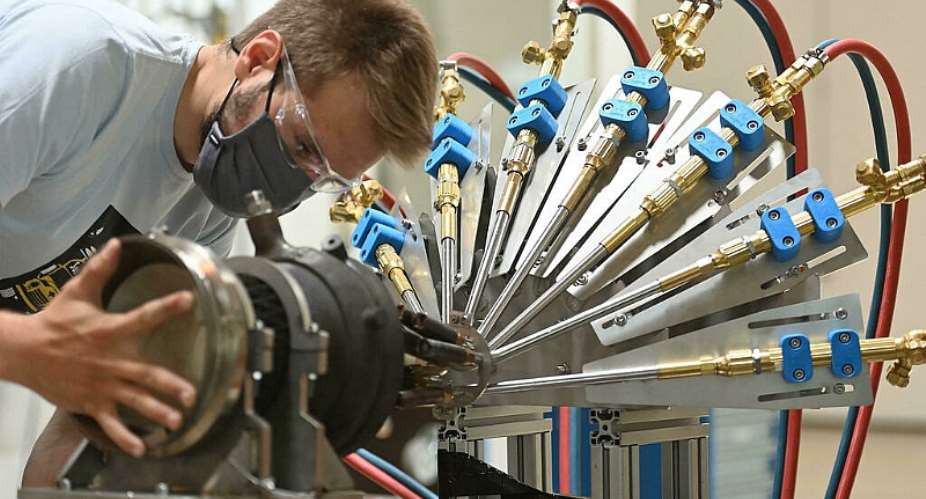Three German startups are developing mini rocket launchers for the increasing number of small satellites which observe the Earth and provide connectivity for the internet of things and smart vehicles.
At the end of July, German company Rocket Factory Augsburg (RFA) carried out a first successful test of its "RFA One" rocket, igniting the engine for eight seconds at its development site in Kiruna, Sweden.
The rocket's "staged combustion" system is used by Elon Musk's SpaceX and Jeff Bezos's Blue Origin, but is yet to be rolled out in Europe.
According to RFA's operational director Joern Spurmann, it allows "30 percent more payload to be put into orbit".
Another German firm, Baden-Wuerttemberg based HyImpulse, has also made waves with a 20-second engine test on the Shetland Isles in May, using a candle-wax-based fuel to maximise efficiency.
"Our technology is advanced enough to serve the mini-launcher market," said HyImpulse co-founder Christian Schmierer.
Isar Aerospace, which is run from just outside Munich by three directors in their thirties, is yet to carry out its first engine test, but is the most well-financed of the three.
- World's first reprogrammable satellite launched into space from French Guiana
- ESA's future Jupiter probe successfully completes critical test
Backed by investors such as the Swiss bank Lombard Odier, venture capitalists HV Capital and holding company Porsche SE, the startup has amassed more than 150 million euros ($180 million) in funding, and is hoping to launch its "Spectrum" rocket for the first time in 2022.
Isar Aerospace predicts that the mini-launcher market will grow to "more than 30 billion euros by 2027, with small and medium-sized satellites making up around a third of it".
Weighing only a few hundred kilograms, these small satellites are tiny compared to the machines of up to 10 tonnes which are sent into orbit by the European Space Agency's Ariane rockets.
"A large rocket is like a long-distance bus which drops all its passengers at the same stop. A micro-launcher works like a taxi, placing the satellites exactly where the client wants them," explained Christian Schmierer of HyImpulse.
According to Isar Aerospace founder Daniel Metzler, the smallest ones will be little more than "boxes of around 10 centimetres, weighing just one kilogram (2.2 pounds) and orbiting the Earth at 28,000 kilometres per hour".
Reducing size and maximising efficiency also means lowering costs.
"In time, we will be able to load 1.3 tonnes of material for five million euros, a price significantly lower than the competition at 3,850 euros per kilo," said RFA.
The three German startups are aiming to eventually assemble a fleet of 20 to 40 partially reusable rockets, guaranteeing dozens of launches per year.
Subcontractors in the automobile industry, many of whom are looking to diversify away from combustion engine vehicles, will provide engine parts for the rockets.
"We want to create a Henry Ford moment for space travel," said Spurmann, in reference to the American industrialist who revolutionised the production of cars in the early 20th century.
(AFP)





 Tuesday’s downpour destroys ceiling of Circuit Court '8' in Accra
Tuesday’s downpour destroys ceiling of Circuit Court '8' in Accra
 SOEs shouldn't compromise on ethical standards, accountability – Akufo-Addo
SOEs shouldn't compromise on ethical standards, accountability – Akufo-Addo
 Father of 2-year-old boy attacked by dog appeals for financial support
Father of 2-year-old boy attacked by dog appeals for financial support
 Jubilee House National Security Operative allegedly swindles businessman over sa...
Jubilee House National Security Operative allegedly swindles businessman over sa...
 Nobody can order dumsor timetable except Energy Minister – Osafo-Maafo
Nobody can order dumsor timetable except Energy Minister – Osafo-Maafo
 Mahama wishes National Chief Imam as he clock 105 years today
Mahama wishes National Chief Imam as he clock 105 years today
 J.B.Danquah Adu’s murder trial: Case adjourned to April 29
J.B.Danquah Adu’s murder trial: Case adjourned to April 29
 High Court issues arrest warrant for former MASLOC Boss
High Court issues arrest warrant for former MASLOC Boss
 Align academic curriculum with industry needs — Stanbic Bank Ghana CEO advocates
Align academic curriculum with industry needs — Stanbic Bank Ghana CEO advocates
 Election 2024: We'll declare the results and let Ghanaians know we've won - Manh...
Election 2024: We'll declare the results and let Ghanaians know we've won - Manh...
